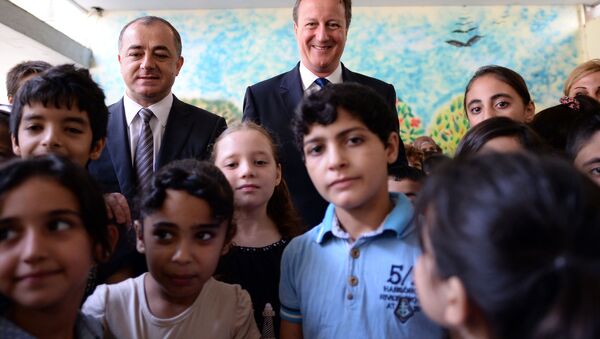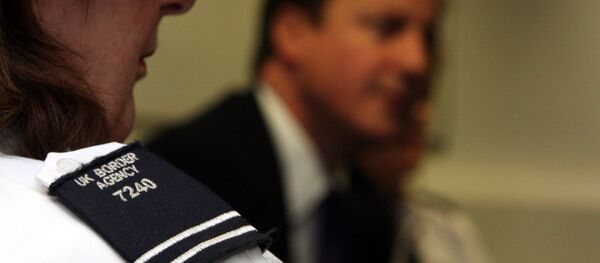Lebanon's hospitality has been somewhat stretched since the beginning of the Syrian civil war and the Israeli-Palestinian conflict, with nearly a quarter of the country's population made up of refugees. Sharing the burden with Jordan, Lebanon is one of the region's tiniest nations — with limited resources and weak infrastructure.
Lebanon has 1.2m Syrian refugees. Here’s Lebanon compared to the UK. pic.twitter.com/obBTJhpFpe
— Derek Payne (@mrderekpayne) September 8, 2015
The refugee influx isn't slowing down either, with the number of migrants arriving in Lebanon increasing at a steady rate. According to the United Nations, half a million of these people are children under the age of 18.
UK international development secretary Justine Greening, who has been visiting the region ahead of a conference on Syria, scheduled to take place in London next week, has suggested that Lebanon, along with Jordan, give Syrians access to schools and jobs.
.@justinegreening: '@supportsyrians isn’t just more funding, it’s about creating jobs & getting every Syrian refugee child back into school'
— Supporting Syria (@SupportSyrians) January 24, 2016
The refugee influx has also been hitting Europe hard, leaving politicians divided and European ideals challenged.
Lebanon, however, now holds almost the same amount of refugees as Europe altogther. Germany is bearing the brunt of the crisis, having accepted hundreds of thousands of people last year alone. Britain however, has agreed to resettle just 20,000 Syrians — from camps in the Middle East — over the next five years.
— David Cameron (@David_Cameron) September 4, 2015
Taking refugees direct from camps allows a safe route to the UK, rather than the hazardous journey that's cost so many lives (2/2).
— David Cameron (@David_Cameron) September 4, 2015
Amnesty International, Oxfam and a number of charities have branded UK's response to the situation as "clearly inadequate."
"The UK can and should be doing much more to ensure that refugees are not compelled to take life-threatening journeys or forced into smugglers' hands," a coalition of charities said.
During his first visit to Lebanon in September 2015, Cameron urged the international community to boost spending for refugee camps in the region and said that failing to do so would mean more people would try to reach Europe.
"I would encourage others to step up to the plate and spend and invest in the way Britain has done," he said.
I'm at a refugee camp in Lebanon, hearing some heartbreaking stories. British aid is doing so much to help. pic.twitter.com/dqpCfDgVKM
— David Cameron (@David_Cameron) September 14, 2015
Unsurprisingly, his international development secretary, Justine Greening, is echoing the UK prime minister's desire to curb the refugee influx into Europe — not only by funding camps in countries like Lebanon and Jordan, but also by putting diplomatic pressure on the authorities to change their laws.
Speaking to Buzzfeed, Justine Greening, expressed confidence in reaching a "groundbreaking and historic" deal with the two Middle Eastern countries at the Syria conference next week.
"…I think increasingly they've reached the same conclusion I've reached — which is if they can make that leap of faith to say ‘We can change our labor laws, maybe allow people to work legally', fundamentally that could pull in investment [so there] aren't just jobs for refugees but jobs for their people, which they need to create growth.
"In the long term, refugees will be able to go back home and the jobs will still be there, with maybe 100% Jordanians in them."
However, the Lebanese social affairs minister Rashid Derbas hadn't reached the same conclusion it seems. In what is considered a blow to the UK government and Justine Greening's efforts, Derbas rather bluntly pointed out that his country was "not a warehouse for people."
Speaking to the Lebanon-based Daily Star newspaper, Derbas said:
"Lebanon has been unstinting in its efforts to meet its neighborly and humanitarian obligations. But Lebanon is not a warehouse for people. Lebanon is weak and poor."
He reiterated the view that the international community should be looking for a way to end the war in Syria through a peaceful diplomatic solution, such as the one Russia has been pushing for ever since the crisis began.
"It is incumbent on the international community to impose a peaceful solution on Syria, so that Syrians can return to their homes. This is the solution, instead of burdening [Lebanon, Jordan, and Turkey] with the consequences of its inaction and, perhaps, conspiracy."
Derbas also mentioned changing the country's labor laws, saying it was "not appropriate, considering the high rate of Lebanese unemployment," and that the education system "doesn't have the capacity to accommodate more than half" of Syrian refugee children.
The blowback response from Lebanon will no doubt impede the UK's plans for a deal on labor and education laws, which Justine Greening was so confident would be reached at next week's Syria conference.
And whilst officials continue to debate UK's own refugee policy and whether it should change at all, Lebanon — a tiny country, the size of a few English counties — already crumbling under the influx of refugees, is expected to give into Britain's pressure and do even more for the Syrian people.



